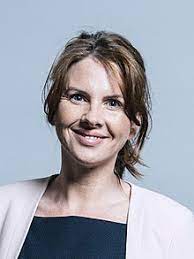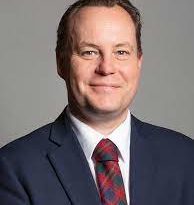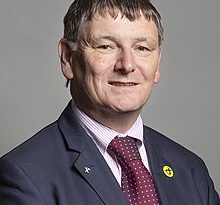Trudy Harrison – 2022 Speech on Transport
The speech made by Trudy Harrison, the Parliamentary Under-Secretary of State for Transport, in the House of Commons on 19 May 2022.
It is my absolute pleasure to close this debate and I welcome the spirited contributions from hon. Members on both sides of the House. It is clear that transport elicits strong feelings across the House, and indeed across the country—and rightly so. The frequency of people’s local bus or train services, the road congestion that poisons our air and slows our economy, and the ability to walk or get on a bike safely all affect not just our quality of life, but the quality of our life chances.
Transport links connect us to economic opportunities, education and training. We know that talent is distributed right across this great country, so we must ensure that opportunity, which is often enabled by transport, is also realised. The Government want to deliver world-class low-carbon transport infrastructure across the country, because that is how we will level up and reduce the inequalities that have persisted for too long. The Minister of State, Department for Transport, my hon. Friend the Member for Pendle (Andrew Stephenson), outlined the significant transport investment that the Government are already making, as well as our ambitious plans for reform. He described the measures that are essential for building back better and fairer.
I will set out how we are reducing transport emissions, which are our largest contributor of greenhouse gases and make up 27% of our total UK emissions. The Government have made world-leading pledges: we want all new road vehicles to be zero emission in the next two decades, from the largest HGVs to the smallest motorcycles. Electric vehicles are key to that ambition, along with general electrification, sustainable fuel and hydrogen production.
The transport Bill, which was announced last week, will help to drive an electric vehicle revolution and deliver 10 times the number of public charging points by 2030. It will give us powers not only to ensure that local authorities plan and deliver EV charging, but to address private charging, including for those living in multi-occupancy buildings.
Ian Paisley
If all the charging points that are being demanded are delivered, will there be sufficient capacity in electricity production to charge and drive those vehicles? My fear is that there will not, so we will need other solutions as well as electricity.
Trudy Harrison
The generation of electricity is a matter for the Department for Business, Energy and Industrial Strategy, with which I work closely on exactly that point. The Prime Minister has set out that all electricity generated in this country will be low carbon in future, which is also incredibly important.
We already have one of the largest charging networks in Europe with 30,200 publicly available charge points, of which 5,400 are rapid.
Gavin Newlands
Will the Minister give way?
Trudy Harrison
I am sorry; I cannot.
With EVs being cheaper to own, run and maintain than their petrol and diesel equivalents, which means that drivers can save hundreds of pounds by going electric, it is no wonder that their market share has doubled compared with last year.
The future is not just electric; it is also active. The Government are committed to ensuring that half of all journeys by 2030 are cycled or walked. That commitment will be delivered by the first dedicated Government cycling and walking body, Active Travel England. Its role will be to ensure that walking and cycling is the easiest choice for local journeys, to help design the right infrastructure and, ultimately, to usher in a golden age of active travel. I thank the hon. Members for Putney (Fleur Anderson) and for Canterbury (Rosie Duffield) and others for their enthusiasm for active travel.
We are certainly not wasting any time. Only last week, we announced a £200 million investment to boost the take-up of cycling and walking. One hundred and thirty-four schemes will create new footways, cycle lanes and pedestrian crossings across 46 local authorities outside London. Nineteen authorities, including in Nottinghamshire, Hull and Manchester, will receive funding to develop the “mini Holland” feasibility studies. We will also accelerate the take-up of electric cycles by offering short and long-term loans.
Active travel is one of the best returns on investment decisions that the Government can make. It makes us healthier, saves the NHS up to £1 billion a year, reduces congestion on our roads and makes our economy more efficient. It is a zero-carbon way to travel, cleaning up our air and reducing emissions. We saw that happening in the pandemic and that is why we are investing £2 billion in our active travel fund. We are determined to ensure that the recent rise in cycling and walking is not a passing fad.
Hon. Members have raised important themes throughout the debate. The subject of electric vehicle charge points was raised by the hon. Members for Erith and Thamesmead (Abena Oppong-Asare) and for Richmond Park (Sarah Olney). As I have said, we plan to have 10 times the amount of EV charge points, as was set out in our EV infrastructure strategy.
Several Members raised the levels of rail service across the UK, including my hon. Friend the Member for Newbury (Laura Farris), who also celebrated Crossrail’s opening. That was great to hear. My hon. Friend the Member for Hyndburn (Sara Britcliffe) championed SELRAP to join Yorkshire and Lancashire together over 13 miles of newly instated railway, which was a problem from the Beeching cuts. My hon. Friend the Member for Hertford and Stortford (Julie Marson) also raised the rail service.
To ensure that people could get to where they needed to be during the pandemic, the Government committed £16 billion of support throughout the pandemic to keep rail services running. Demand continues to recover. We are working with operators to ensure that services are fit for the future, carefully balancing cost, capacity and the performance that passengers rightly expect to see on their railways.
In the Wakefield and Yorkshire area, Members will, I am sure, be aware of the £830 million awarded to the West Yorkshire Combined Authority under our city region sustainable transport settlement. That will help to strengthen public transport across the area.
A number of Members asked about bus services. I commend the consistent and fantastic championing of Wrightbus by the hon. Member for North Antrim (Ian Paisley). I have had the joy of visiting it in Ballymena, including only last week at a heavy goods vehicle launch, where we committed to a £200 million zero-emission road freight programme. Other Members, including one from Southend city, my hon. Friend the Member for Southend West (Anna Firth), and my hon. Friend the Member for Harrogate and Knaresborough (Andrew Jones), also mentioned the importance of buses. We have provided more than £2.5 billion in new funding to support improvement of bus services, and are on track to meet our commitment of £3 billion for bus service transformation.
Members have noted the level of fares on rail and bus networks. Regulated rail fares increased in line with inflation—by 3.8%—on 1 March. As in 2021, we temporarily delayed the fares increase, enabling passengers to purchase tickets at last year’s prices throughout January and February 2022. The spending review settlement agreed last autumn will see the Government invest £360 million in rail fares, ticketing and retailing, delivering a major overhaul of the way in which rail travel is bought and paid for. Last year, we also announced new flexible season tickets, which are helping to reduce the cost of rail travel for commuters.
I pay particular tribute to my hon. Friend the Member for West Dorset (Chris Loder). He is a real champion of the rail industry but he also mentioned freight and the work that we are doing with freight operators up and down the country. I also pay tribute to my hon. Friend the Member for Dover (Mrs Elphicke) for how she champions her area and the way she manages the balance between local, national and international interests.
Many Members are concerned about the cost of living. As the Minister of State, my hon. Friend the Member for Pendle outlined, we recently launched the Great British rail sale, available throughout the network and across a wide number of routes, including cross-border journeys with Scotland and Wales. Those tickets support business and commuter markets and help to drive leisure demand. That promotes local economies at destinations in scope, which receive a boost from the increased activity. More than 1.3 million tickets were sold in the sale, offering about £7 million-worth of savings for passengers.
My hon. Friend the Member for Bexhill and Battle (Huw Merriman) is the most fantastic advocate and champion. He scrutinises our work but also supports the changes that we need to make. We are providing more than £525 million for zero-emission buses in this Parliament, and we have supported the funding of nearly 2,000 zero-emission buses in England so far.
In conclusion, we cannot begin to tackle some of the most pressing challenges, be they the cost living, levelling up or climate change, without a world-class transport system. We were elected to be a reforming Government, unafraid to make the big decisions to shake up our transport industry so that it drives economic growth. That is exactly what we are doing, across road and rail, sky and sea, delivering world-class infrastructure, ambitious reform and record investment.



